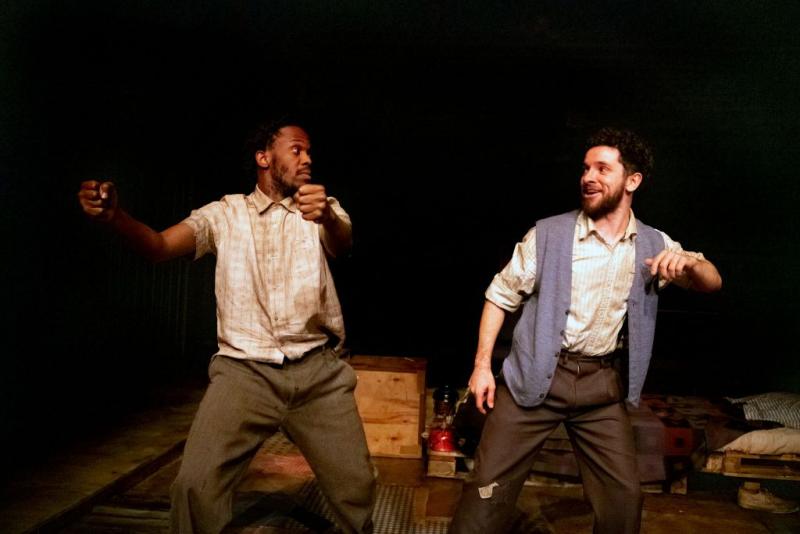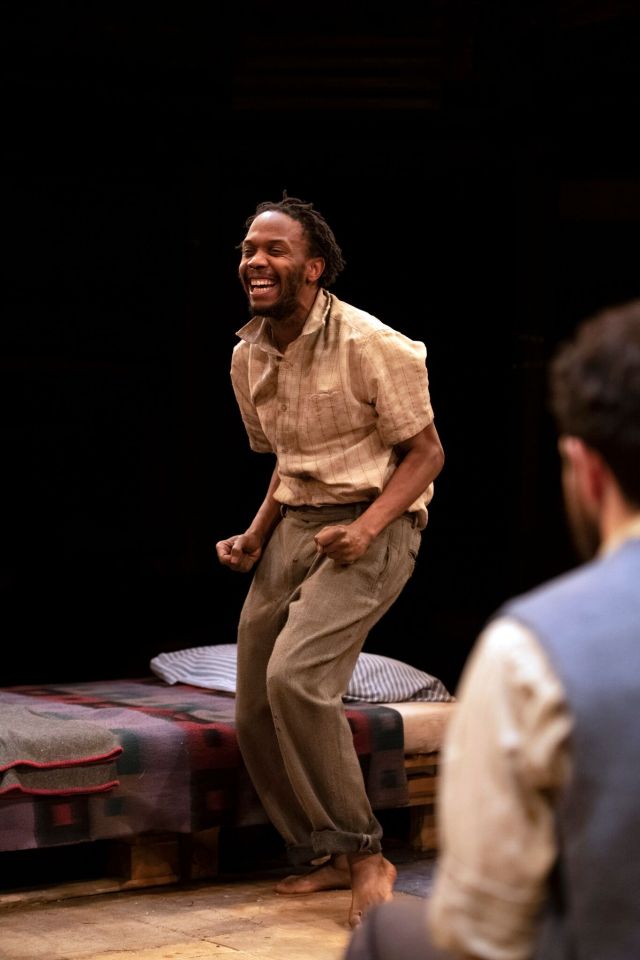Blood Knot, Orange Tree Theatre review - defining apartheid-era drama delivers afresh | reviews, news & interviews
Blood Knot, Orange Tree Theatre review - defining apartheid-era drama delivers afresh
Blood Knot, Orange Tree Theatre review - defining apartheid-era drama delivers afresh
Athol Fugard's seminal 1961 play hasn't lost its potency

London's impromptu mini-season devoted to the work of Athol Fugard picks up real steam with Blood Knot, Matthew Xia's transfixing take on one of the benchmark titles of the apartheid era and beyond.
The situation couldn't be simpler, the emotions it unleashes more complex. In a shack in a corner of Port Elizabeth known for the presence of donkeys and an abiding stench live two coloured half-brothers. Morrie (Nathan McMullen) is the lighter-skinned, literate one of the two: an intense, compactly built figure who tends to the cooking and reads passages of scripture aloud. Hesitant in his own skin, he couldn't contrast more strongly with the dark-skinned Zacharias (Kalungi Ssebandeke), or Zach, a springy, electric presence who lives in the body as fully as Morris lives in the mind.
 So it's not altogether surprising when Morrie abets Zach's desire for female companionship by penning replies on Zach's behalf to various women advertising in the local paper for pen pals. And when one of these prospects, Ethel, actually comes back with a written response and photo, the inevitable fact of her white skin, and its attendant privilege, bumps up against the brothers' hardscrabble reality in a narrative rife with game-playing that builds to its deeply serious, eternally wounding conclusion.
So it's not altogether surprising when Morrie abets Zach's desire for female companionship by penning replies on Zach's behalf to various women advertising in the local paper for pen pals. And when one of these prospects, Ethel, actually comes back with a written response and photo, the inevitable fact of her white skin, and its attendant privilege, bumps up against the brothers' hardscrabble reality in a narrative rife with game-playing that builds to its deeply serious, eternally wounding conclusion.
For a while, Fugard finds real comedy in the incongruousness of the situation, and the wonderful Ssebandeke, in a career-making performance, all but quivers with anticipation at the female delights that lie by definition out of reach. But it isn't long before one is aware of Zach needling Morrie about a lack of sexual awareness in his feverishly animated, brainier brother that may be indicative of something else. And as the pair, Godot-like, embark upon a series of play-acting scenarios intended largely to while away the time, their symbiosis threatens to be rent asunder by the penetrating toxicity of a racist culture that leaves no one free from its malignant grip. Not for nothing is the Bible regularly invoked.
Xia's direction shows here the same gift for tightening the noose that he brought to his excellent Young Vic reappraisal of Blue/Orange several years ago, and one only wishes the scene changes were a tad less fussy (the ambient music doesn't add much); nor do either of the two acts land as decisively in their closing moments as the galvanic material that precedes them. But the production as a whole has a momentum missing from the comparatively stolid revival of Fugard's later, and also-great, A Lesson from Aloes, that has been playing at the Finborough across town. Its young actors, too, are fully attuned to its trembling heart.
Morrie, the less obviously rewarding of the two roles, nonetheless exists on a spectrum of self-loathing common to the fairer-skinned, or white, characters that populate Fugard's work. McMullen keenly captures an agile mind at odds with itself and yearning for a fresh start (the brothers are saving up for a farm), even as the harsh reality of his present is beginning to do him in. "Say something to help me," Morrie says tellingly late on to Zach, the brother whom he has been busy helping only for Morrie to be found in need of succour himself. Ssebandeke's entirely riveting Zach, meanwhile, lets words like "prejudice" and "inhumanity" linger on the tongue rather like alien entities to which he is becoming accustomed – until such point as their stinging force hits quite literally home.
- Blood Knot at Orange Tree Theatre to 20 April
- Read more theatre reviews on theartsdesk
rating
Explore topics
Share this article
The future of Arts Journalism
You can stop theartsdesk.com closing!
We urgently need financing to survive. Our fundraising drive has thus far raised £49,000 but we need to reach £100,000 or we will be forced to close. Please contribute here: https://gofund.me/c3f6033d
And if you can forward this information to anyone who might assist, we’d be grateful.

Subscribe to theartsdesk.com
Thank you for continuing to read our work on theartsdesk.com. For unlimited access to every article in its entirety, including our archive of more than 15,000 pieces, we're asking for £5 per month or £40 per year. We feel it's a very good deal, and hope you do too.
To take a subscription now simply click here.
And if you're looking for that extra gift for a friend or family member, why not treat them to a theartsdesk.com gift subscription?
more Theatre
 Edinburgh Fringe 2025 reviews: Ordinary Decent Criminal / Insiders
Two dramas on prison life offer contrasting perspectives but a similar sense of compassion
Edinburgh Fringe 2025 reviews: Ordinary Decent Criminal / Insiders
Two dramas on prison life offer contrasting perspectives but a similar sense of compassion
 Edinburgh Fringe 2025 reviews: Kinder / Shunga Alert / Clean Your Plate!
From drag to Japanese erotica via a French cookery show, three of the Fringe's more unusual offerings
Edinburgh Fringe 2025 reviews: Kinder / Shunga Alert / Clean Your Plate!
From drag to Japanese erotica via a French cookery show, three of the Fringe's more unusual offerings
 The Two Gentlemen of Verona, RSC, Stratford review - not quite the intended gateway drug to Shakespeare
Shakespeare trying out lots of ideas that were to bear fruit in the future
The Two Gentlemen of Verona, RSC, Stratford review - not quite the intended gateway drug to Shakespeare
Shakespeare trying out lots of ideas that were to bear fruit in the future
 Edinburgh Fringe 2025 reviews: The Horse of Jenin / Nowhere
Two powerful shows consider the Israeli-Palestinian conflict, with mixed results
Edinburgh Fringe 2025 reviews: The Horse of Jenin / Nowhere
Two powerful shows consider the Israeli-Palestinian conflict, with mixed results
 Edinburgh Fringe 2025 reviews: The Fit Prince / Undersigned
A joyful gay romance and an intimate one-to-one encounter in two strong Fringe shows
Edinburgh Fringe 2025 reviews: The Fit Prince / Undersigned
A joyful gay romance and an intimate one-to-one encounter in two strong Fringe shows
 Tom at the Farm, Edinburgh Fringe 2025 review - desire and disgust
A visually stunning stage re-adaptation of a recent gay classic plunges the audience into blood and earth
Tom at the Farm, Edinburgh Fringe 2025 review - desire and disgust
A visually stunning stage re-adaptation of a recent gay classic plunges the audience into blood and earth
 Works and Days, Edinburgh International Festival 2025 review - jaw-dropping theatrical ambition
Nothing less than the history of human civilisation is the theme of FC Bergman's visually stunning show
Works and Days, Edinburgh International Festival 2025 review - jaw-dropping theatrical ambition
Nothing less than the history of human civilisation is the theme of FC Bergman's visually stunning show
 Every Brilliant Thing, @sohoplace review - return of the comedy about suicide that lifts the spirits
Lenny Henry is the ideal ringmaster for this exercise in audience participation
Every Brilliant Thing, @sohoplace review - return of the comedy about suicide that lifts the spirits
Lenny Henry is the ideal ringmaster for this exercise in audience participation
 Edinburgh Fringe 2025 reviews: The Beautiful Future is Coming / She's Behind You
A deft, epoch-straddling climate six-hander and a celebration (and take-down) of the pantomime dame at the Traverse Theatre
Edinburgh Fringe 2025 reviews: The Beautiful Future is Coming / She's Behind You
A deft, epoch-straddling climate six-hander and a celebration (and take-down) of the pantomime dame at the Traverse Theatre
 Good Night, Oscar, Barbican review - sad story of a Hollywood great's meltdown, with a dazzling turn by Sean Hayes
Oscar Levant is an ideal subject to refresh the debate about media freedom
Good Night, Oscar, Barbican review - sad story of a Hollywood great's meltdown, with a dazzling turn by Sean Hayes
Oscar Levant is an ideal subject to refresh the debate about media freedom
 Edinburgh Fringe 2025 reviews - Monstering the Rocketman by Henry Naylor / Alex Berr
Tabloid excess in the 1980s; gallows humour in reflections on life and death
Edinburgh Fringe 2025 reviews - Monstering the Rocketman by Henry Naylor / Alex Berr
Tabloid excess in the 1980s; gallows humour in reflections on life and death
 Edinburgh Fringe 2025 reviews: Lost Lear / Consumed
Twists in the tail bring revelations in two fine shows at the Traverse Theatre
Edinburgh Fringe 2025 reviews: Lost Lear / Consumed
Twists in the tail bring revelations in two fine shows at the Traverse Theatre

Add comment